Tuesday, July 17, 2018
Since 2005, propane industry members have been participating in Propane Days around June each year. Built on the principle of awareness, the goal continues to be to elevate the stature of the industry so that propane is not just lumped in with a variety of other fuels. In the past, “fly-ins” were sometimes held to stop specific legislation that was considered damaging to the industry. The concept of Propane Days was to present a more proactive approach by staying in touch with legislators even when issues aren’t as pressing. 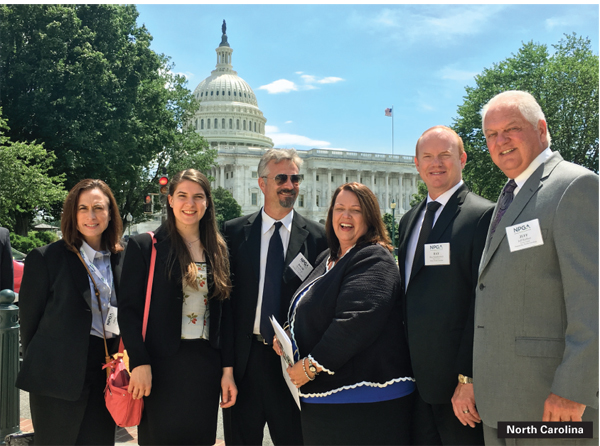
“We really have a ‘1-2-3 Punch’ in opening lines of communication,” said Aaron DeWeese, executive director of the Illinois Propane Gas Association. “Propane Days is our high-profile event, but we also have NPGA staff in Washington lobbying throughout the year and we have more and more industry members meeting with legislators and their staff members in their districts.”
In 2018, the National Propane Gas Association (NPGA) introduced a new app for smart devices called NPGAction. A free download, the app keeps industry members up-to-date with a handy reference on the key topics the association feels members should be lobbying legislators about. In addition, five webinars were held in the weeks prior to Propane Days to discuss the details of the main topics members were to address with legislators and staff.
OSHA Crane Rule Showdown
“This year was a productive Propane Days for the Georgia delegation,” said Jenni McKeen, executive director of the Georgia Propane Gas Association. “We were pleased to have one of the representatives from Georgia, Drew Ferguson, willing to introduce H.R. 5988, the Common Sense Certification Reform Act.” This act would exempt propane tank delivery and retrieval from the Occupational Safety and Health Administration’s (OSHA) Crane Rule. This rule, which will go into effect later this year if not stopped, requires excessive and expensive third-party certification every five years for employees delivering a propane tank to a location with construction activities. The propane industry already has a training program, Mobile Crane Training Program, tailor-made for delivery and retrieval of propane tanks that was funded by the Propane Education & Research Council. This program does not satisfy the OSHA crane rule because it doesn’t include third-party certification. A conservative estimate of $151 million in certification and training costs will be incurred by the propane gas industry if the reform act is not passed.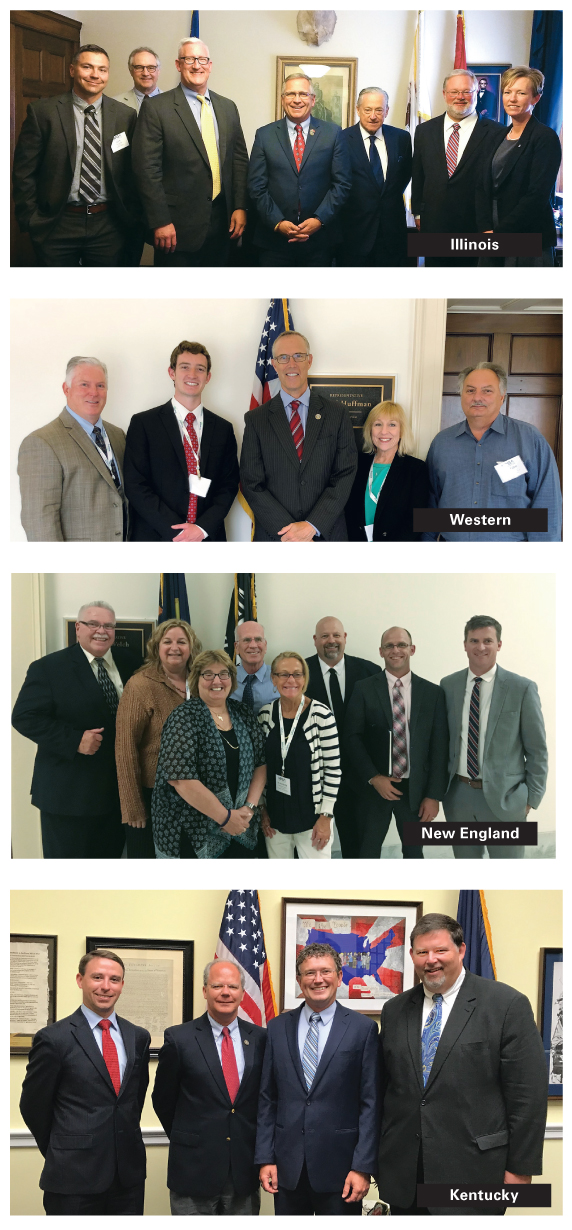
OSHA has in the past twice delayed compliance dates for third-party certification in response to significant opposition. “The temporary exemptions are not our ultimate goal,” said NPGA’s Phil Squair, senior vice president of public and government affairs. “We’re delighted to have Representative Ferguson willing to introduce a bill to exempt the propane industry from this huge overreach by OSHA which makes no sense for our members.” Squair noted that Ferguson, who is a dentist, has experienced firsthand overreach by OSHA in requiring costly third-party certification for his employees. According to Squair, Ferguson said, “I want this issue.” During Propane Days and in the days following, NPGA members were encouraged to seek co-sponsors among the members of Congress. “Most of the rest of our congressmen in Georgia will also be co-sponsoring H.R. 5988 with Ferguson,” McKeen said. “We are also pleased that at least two and possibly more are joining the Congressional Propane Caucus.”
Dan Richardson, president and CEO of Conger LP Gas in Tifton, Ga., is the state director for NPGA and had the opportunity to introduce Ferguson to industry members. “I can justify the cost of a trip to Propane Days, $1200 after the Georgia Propane Gas Association also funds $1000 of the cost, with the savings of $60,000 every five years,” Richardson said. “That’s just the cost to my company that I’ll help eliminate if this bill is approved and OSHA’s overreach is stopped. Almost all of Georgia’s congressional leaders were unaware of how onerous this rule is going to be.” Richardson is pleased that members of the Georgia delegation are supporting Ferguson’s bill. “Our legislators understand that excessive costs for certification will be passed along to their constituents. Everyone screams to Congress when prices go up significantly,” Richardson said. “Our point to congressmembers is that they are the ones allowing prices to go up unnecessarily if the OSHA overreach continues and the 80-year-old lady on a fixed income has a higher energy bill.”
Squair said that opposition to Ferguson’s bill will come from the training services that would benefit from the $151 million propane industry members will have to spend on third-party certification. “The other challenge of course is OSHA, like many bureaucratic entities, doesn’t like to give up jurisdiction,” Squair said. “But we are approaching this from all angles. We are working to get a sponsor in the Senate for legislation and we are working with leadership in the White House to help us make the case that OSHA is going against the regulatory rollback philosophy of the administration.”
The Missouri delegation focused a lot of its time with legislators on the OSHA crane rule. “We visited all eight Congressional offices and both Senate offices,” said Steve Ahrens, president and CEO of the Missouri Propane Gas Association. “We’d like to invite the representatives to visit some bulk plants to truly understand how small our crane operations are versus large cranes that are operated five or more hours at a time on the top of Washington, D.C. and New York City skyscrapers.”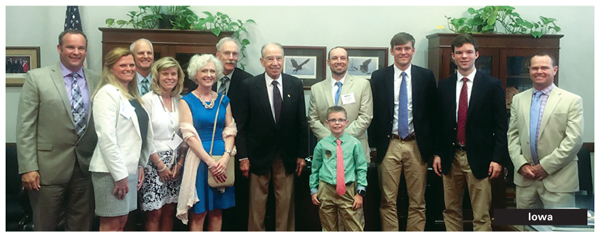
Illinois’ DeWeese said his members have been hosting legislators for tours of their bulk plants for the past several summers as a follow-up to Propane Days. “Once they see and understand the technicalities of the issue, they are able to go back to D.C. and talk about pending legislation very intelligently,” he said. “The partnership between NPGA and the state associations really works well when we all work together to present our consistent concerns to members of Congress.” DeWeese said his delegation visited nine Illinois House members’ offices and the offices of both Senators. “With Propane Days held annually, I feel legislators make room for us now on the legislative calendar and they are receptive to our agenda,” he said. “It is good we bring a mobilized army to Propane Days each year. I feel we moved the needle!”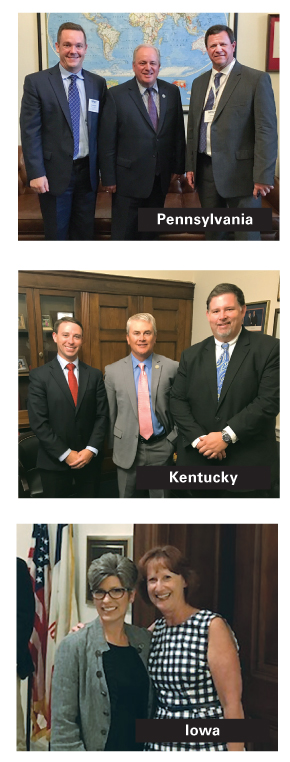
DRIVE Safe Act
While the OSHA crane rule legislation was widely viewed as the most urgent issue to be addressed, NPGA encouraged discussion of three other topics with legislators at Propane Days. A second issue also had an ask tied to the passage of a bill, H.R. 5358, the DRIVE Safe Act, which would create an apprenticeship program for commercial drivers. The DRIVE Safe Act would allow regulations to permit an 18- to 21-year-old CDL holder to drive a commercial vehicle across state lines, during and upon completion of a two-step apprenticeship program. NPGA wanted members to encourage support for and co-sponsorship of the bill. “This bill and our message regarding it resonated very well with the West Virginia legislators and staff members,” said Tom Osina, executive director of the West Virginia Propane Gas Association. “Our state leaders are very interested in all programs that put people to work in West Virginia. This issue, above all others, resonated the best with those representing West Virginia.”
Jones Act Waiver
Another issue high on the agenda for Propane Days but amid concern about the level of support it would receive was the Jones Act. This issue did not have a specific bill attached to it but sought a waiver from the Jones Act for propane shipments. There are simply no Jones Act-compliant propane cargo vessels, so a requirement that only U.S.-flagged ships, constructed in the U.S., owned by U.S. citizens, and crewed by U.S. citizens and U.S. permanent residents can transport propane from one U.S. port to another means propane cannot move directly from a U.S. port to another U.S. port without a waiver. In recent years, when propane was needed desperately in the Northeast, it had to be imported from Algeria or another foreign country. Clearly, this is not an ideal situation in a propane supply crisis. “The Propane Gas Association of New England and the New York Propane Gas Association are attached at the hip on this issue,” said Rick Cummings, chairman of the legislative committee for the New York Propane Gas Association. “Cold weather and supply shortage put us both in the same rough spot.”
Cummings and a small contingent from New York met with key representatives from four districts in New York. “We have several representatives, some of whom are members of the Congressional Propane Caucus, we like to connect with as much as possible. I am proud of the way our industry, especially here in the Northeast, works hard to take ownership of its own issues and resolve them through every means possible before having to go to Congress,” Cummings said. “2009 presented horrible supply challenges and we started seeing railcar terminals pop up everywhere, more storage being put in, more focus on supply planning by retailers, and we were able to alleviate a large chunk of our challenges on our own. When we come to Congress, we can say, ‘Here is the action we have taken. We’re just trying to keep your constituents warm in the winter. Here is where we need help.’ That helps get us from the eye roll we often see when the Jones Act is brought up to some interest in helping us out.”
From the perspective of the Propane Gas Association of New England (PGANE), CEO and president Leslie Anderson is also used to the eye roll and the cold shoulder when the Jones Act is brought up. Staffers at Congressional offices are well-versed in stating that the Jones Act is important as a matter of national security and an opportunity for American jobs. “We have found a few talking points that resonate at least for the case of narrow exemption,” Anderson said. “We get their attention with the fact that one ship can bring as much propane to the Northeast as 1700 transport trucks. In a shortage situation, a simple narrow waiver of the Jones Act to get propane here can make a huge difference. Cummings and Anderson both felt some headway was made at Propane Days on the Jones Act. “We had two groups; seven met with Connecticut legislators and eight met with legislators from New Hampshire, Maine, and Vermont. Regarding the Jones Act, we stressed the transportation costs are much lower to bring in more propane by ship but that the Jones Act prevents it coming from other U.S. ports,” Anderson said. “That hurts our ability to benefit from our country’s energy independence. We stress that propane is not only needed to keep constituents warm, it is a key fuel in cases of emergencies. Look at the first responders to last year’s hurricanes in the south who used propane to cook food for first responders and to provide fuels for generators.”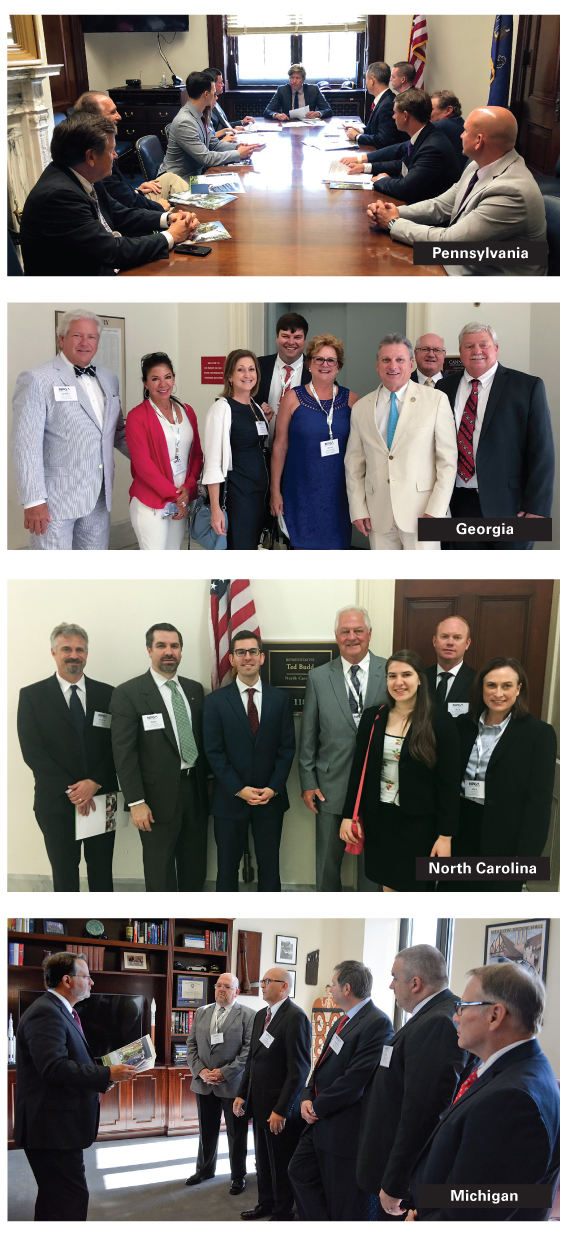
Anderson and the PGANE delegation also are working for propane facilities with less than 100 customers to be exempt from Pipeline and Hazardous Materials Safety Administration (PHMSA) rules on pipelines. Rep. Peter Welch from Vermont sponsored the bill that required a study on the safety of such pipeline facilities. The findings of the study are about to be released and the delegation was able to update him on progress during their visit at Propane Days.
California had primary elections on the same day the propane delegation visited Congressional offices, so it was not able to meet with any legislators. “We did get a quick photo with Senator Feinstein, though,” said Joy Alafia, president and CEO of the Western Propane Gas Association. She felt they garnered support for their case on the crane rule, extension of alternative fuels tax credits, and the DRIVE Safe Act. “They seemed to believe these were all commonsense issues, but we did note occasional pushback on the Jones Act. Some staffers echoed what other delegations were hearing about national security and American jobs. We expressed the other side of the equation as it relates to delivery challenges during peak winter demand and being able to provide a vital fuel for Americans to heat their homes or cook their food, among other basic needs,” Alafia said.
She agreed with the sentiment of others that the timing of Propane Days was good. “Our delegation’s visit was well-timed with the introduction of the two bills regarding the OSHA crane rule and the DRIVE Safe Act. It’s one thing to tell our story, but it’s quite another to complement our story with a call to action. Our members invest their time and resources to make an impact. These two bills gave propane representatives the opportunity to do just that.”
The Iowa Propane Gas Association felt positive about gaining two co-sponsors and a possible third for the DRIVE Safe Act. Congressman King also signed on as a co-sponsor for the OSHA crane act bill. “We also visited with legislators including our Senators Ernst and Grassley about funding for ongoing tax incentives for autogas as well as LIHEAP,” said Deb Grooms, CEO of the Iowa association. “We met with Congressman Loebsack, a co-chair of the Propane Caucus, both at a reception for him as well as at his office.”
Alternative Fuel Tax Credits
Grooms and others felt the legislators understood the value of having tax credit offerings such as the ones for autogas that are ongoing and not just year-to-year. Talking points for extending the alternative fuel tax credits discussed propane is the third most prevalent vehicle fuel behind only gasoline and diesel and that nearly 200,000 vehicles in the United States currently run on propane. With propane engines producing 12% less CO2 emissions, 20% less NOx emissions, and 60% less CO emissions than gasoline engines, they also produce 80% less smog-producing hydrocarbon emissions than diesel engines. “It is a lot tougher sell when tax credits are not always in effect,” Squair said. “Sometimes they are offered retroactively, but we make a better case if we can always say the tax credits are available on an ongoing basis.”
The Michigan and Ohio delegations also met with many of their representatives and Derek Dalling, who leads associations for both states, said they focused on all NPGA talking points and like others felt strong support for the OSHA crane rule bill, some support for the DRIVE Safe Act and the autogas fuel tax credit extensions, and no one was latching on to the Jones Act ask. Dalling also said that there was limited talk of the Enbridge Line 5 issue as lawmakers and others await further reports.
The Communication Continues
Participants in Propane Days and all in the industry can continue to monitor progress made on the NPGAction app and through reports from the NPGA and other media. As DeWeese of Illinois said, communication with legislators can also go on year-round in the form of staff lobbying and constituents talking to legislators in their districts. “There is some power in a constituent visiting with a legislator that is just not there with a contract lobbyist,” DeWeese said. “After Propane Days, there is power in getting legislators out to a bulk plant to see and hear firsthand the issues we face as an industry.” — Pat Thornton

“We really have a ‘1-2-3 Punch’ in opening lines of communication,” said Aaron DeWeese, executive director of the Illinois Propane Gas Association. “Propane Days is our high-profile event, but we also have NPGA staff in Washington lobbying throughout the year and we have more and more industry members meeting with legislators and their staff members in their districts.”
In 2018, the National Propane Gas Association (NPGA) introduced a new app for smart devices called NPGAction. A free download, the app keeps industry members up-to-date with a handy reference on the key topics the association feels members should be lobbying legislators about. In addition, five webinars were held in the weeks prior to Propane Days to discuss the details of the main topics members were to address with legislators and staff.
OSHA Crane Rule Showdown
“This year was a productive Propane Days for the Georgia delegation,” said Jenni McKeen, executive director of the Georgia Propane Gas Association. “We were pleased to have one of the representatives from Georgia, Drew Ferguson, willing to introduce H.R. 5988, the Common Sense Certification Reform Act.” This act would exempt propane tank delivery and retrieval from the Occupational Safety and Health Administration’s (OSHA) Crane Rule. This rule, which will go into effect later this year if not stopped, requires excessive and expensive third-party certification every five years for employees delivering a propane tank to a location with construction activities. The propane industry already has a training program, Mobile Crane Training Program, tailor-made for delivery and retrieval of propane tanks that was funded by the Propane Education & Research Council. This program does not satisfy the OSHA crane rule because it doesn’t include third-party certification. A conservative estimate of $151 million in certification and training costs will be incurred by the propane gas industry if the reform act is not passed.

OSHA has in the past twice delayed compliance dates for third-party certification in response to significant opposition. “The temporary exemptions are not our ultimate goal,” said NPGA’s Phil Squair, senior vice president of public and government affairs. “We’re delighted to have Representative Ferguson willing to introduce a bill to exempt the propane industry from this huge overreach by OSHA which makes no sense for our members.” Squair noted that Ferguson, who is a dentist, has experienced firsthand overreach by OSHA in requiring costly third-party certification for his employees. According to Squair, Ferguson said, “I want this issue.” During Propane Days and in the days following, NPGA members were encouraged to seek co-sponsors among the members of Congress. “Most of the rest of our congressmen in Georgia will also be co-sponsoring H.R. 5988 with Ferguson,” McKeen said. “We are also pleased that at least two and possibly more are joining the Congressional Propane Caucus.”
Dan Richardson, president and CEO of Conger LP Gas in Tifton, Ga., is the state director for NPGA and had the opportunity to introduce Ferguson to industry members. “I can justify the cost of a trip to Propane Days, $1200 after the Georgia Propane Gas Association also funds $1000 of the cost, with the savings of $60,000 every five years,” Richardson said. “That’s just the cost to my company that I’ll help eliminate if this bill is approved and OSHA’s overreach is stopped. Almost all of Georgia’s congressional leaders were unaware of how onerous this rule is going to be.” Richardson is pleased that members of the Georgia delegation are supporting Ferguson’s bill. “Our legislators understand that excessive costs for certification will be passed along to their constituents. Everyone screams to Congress when prices go up significantly,” Richardson said. “Our point to congressmembers is that they are the ones allowing prices to go up unnecessarily if the OSHA overreach continues and the 80-year-old lady on a fixed income has a higher energy bill.”
Squair said that opposition to Ferguson’s bill will come from the training services that would benefit from the $151 million propane industry members will have to spend on third-party certification. “The other challenge of course is OSHA, like many bureaucratic entities, doesn’t like to give up jurisdiction,” Squair said. “But we are approaching this from all angles. We are working to get a sponsor in the Senate for legislation and we are working with leadership in the White House to help us make the case that OSHA is going against the regulatory rollback philosophy of the administration.”
The Missouri delegation focused a lot of its time with legislators on the OSHA crane rule. “We visited all eight Congressional offices and both Senate offices,” said Steve Ahrens, president and CEO of the Missouri Propane Gas Association. “We’d like to invite the representatives to visit some bulk plants to truly understand how small our crane operations are versus large cranes that are operated five or more hours at a time on the top of Washington, D.C. and New York City skyscrapers.”

Illinois’ DeWeese said his members have been hosting legislators for tours of their bulk plants for the past several summers as a follow-up to Propane Days. “Once they see and understand the technicalities of the issue, they are able to go back to D.C. and talk about pending legislation very intelligently,” he said. “The partnership between NPGA and the state associations really works well when we all work together to present our consistent concerns to members of Congress.” DeWeese said his delegation visited nine Illinois House members’ offices and the offices of both Senators. “With Propane Days held annually, I feel legislators make room for us now on the legislative calendar and they are receptive to our agenda,” he said. “It is good we bring a mobilized army to Propane Days each year. I feel we moved the needle!”

DRIVE Safe Act
While the OSHA crane rule legislation was widely viewed as the most urgent issue to be addressed, NPGA encouraged discussion of three other topics with legislators at Propane Days. A second issue also had an ask tied to the passage of a bill, H.R. 5358, the DRIVE Safe Act, which would create an apprenticeship program for commercial drivers. The DRIVE Safe Act would allow regulations to permit an 18- to 21-year-old CDL holder to drive a commercial vehicle across state lines, during and upon completion of a two-step apprenticeship program. NPGA wanted members to encourage support for and co-sponsorship of the bill. “This bill and our message regarding it resonated very well with the West Virginia legislators and staff members,” said Tom Osina, executive director of the West Virginia Propane Gas Association. “Our state leaders are very interested in all programs that put people to work in West Virginia. This issue, above all others, resonated the best with those representing West Virginia.”
Jones Act Waiver
Another issue high on the agenda for Propane Days but amid concern about the level of support it would receive was the Jones Act. This issue did not have a specific bill attached to it but sought a waiver from the Jones Act for propane shipments. There are simply no Jones Act-compliant propane cargo vessels, so a requirement that only U.S.-flagged ships, constructed in the U.S., owned by U.S. citizens, and crewed by U.S. citizens and U.S. permanent residents can transport propane from one U.S. port to another means propane cannot move directly from a U.S. port to another U.S. port without a waiver. In recent years, when propane was needed desperately in the Northeast, it had to be imported from Algeria or another foreign country. Clearly, this is not an ideal situation in a propane supply crisis. “The Propane Gas Association of New England and the New York Propane Gas Association are attached at the hip on this issue,” said Rick Cummings, chairman of the legislative committee for the New York Propane Gas Association. “Cold weather and supply shortage put us both in the same rough spot.”
Cummings and a small contingent from New York met with key representatives from four districts in New York. “We have several representatives, some of whom are members of the Congressional Propane Caucus, we like to connect with as much as possible. I am proud of the way our industry, especially here in the Northeast, works hard to take ownership of its own issues and resolve them through every means possible before having to go to Congress,” Cummings said. “2009 presented horrible supply challenges and we started seeing railcar terminals pop up everywhere, more storage being put in, more focus on supply planning by retailers, and we were able to alleviate a large chunk of our challenges on our own. When we come to Congress, we can say, ‘Here is the action we have taken. We’re just trying to keep your constituents warm in the winter. Here is where we need help.’ That helps get us from the eye roll we often see when the Jones Act is brought up to some interest in helping us out.”
From the perspective of the Propane Gas Association of New England (PGANE), CEO and president Leslie Anderson is also used to the eye roll and the cold shoulder when the Jones Act is brought up. Staffers at Congressional offices are well-versed in stating that the Jones Act is important as a matter of national security and an opportunity for American jobs. “We have found a few talking points that resonate at least for the case of narrow exemption,” Anderson said. “We get their attention with the fact that one ship can bring as much propane to the Northeast as 1700 transport trucks. In a shortage situation, a simple narrow waiver of the Jones Act to get propane here can make a huge difference. Cummings and Anderson both felt some headway was made at Propane Days on the Jones Act. “We had two groups; seven met with Connecticut legislators and eight met with legislators from New Hampshire, Maine, and Vermont. Regarding the Jones Act, we stressed the transportation costs are much lower to bring in more propane by ship but that the Jones Act prevents it coming from other U.S. ports,” Anderson said. “That hurts our ability to benefit from our country’s energy independence. We stress that propane is not only needed to keep constituents warm, it is a key fuel in cases of emergencies. Look at the first responders to last year’s hurricanes in the south who used propane to cook food for first responders and to provide fuels for generators.”

Anderson and the PGANE delegation also are working for propane facilities with less than 100 customers to be exempt from Pipeline and Hazardous Materials Safety Administration (PHMSA) rules on pipelines. Rep. Peter Welch from Vermont sponsored the bill that required a study on the safety of such pipeline facilities. The findings of the study are about to be released and the delegation was able to update him on progress during their visit at Propane Days.
California had primary elections on the same day the propane delegation visited Congressional offices, so it was not able to meet with any legislators. “We did get a quick photo with Senator Feinstein, though,” said Joy Alafia, president and CEO of the Western Propane Gas Association. She felt they garnered support for their case on the crane rule, extension of alternative fuels tax credits, and the DRIVE Safe Act. “They seemed to believe these were all commonsense issues, but we did note occasional pushback on the Jones Act. Some staffers echoed what other delegations were hearing about national security and American jobs. We expressed the other side of the equation as it relates to delivery challenges during peak winter demand and being able to provide a vital fuel for Americans to heat their homes or cook their food, among other basic needs,” Alafia said.
She agreed with the sentiment of others that the timing of Propane Days was good. “Our delegation’s visit was well-timed with the introduction of the two bills regarding the OSHA crane rule and the DRIVE Safe Act. It’s one thing to tell our story, but it’s quite another to complement our story with a call to action. Our members invest their time and resources to make an impact. These two bills gave propane representatives the opportunity to do just that.”
The Iowa Propane Gas Association felt positive about gaining two co-sponsors and a possible third for the DRIVE Safe Act. Congressman King also signed on as a co-sponsor for the OSHA crane act bill. “We also visited with legislators including our Senators Ernst and Grassley about funding for ongoing tax incentives for autogas as well as LIHEAP,” said Deb Grooms, CEO of the Iowa association. “We met with Congressman Loebsack, a co-chair of the Propane Caucus, both at a reception for him as well as at his office.”
Alternative Fuel Tax Credits
Grooms and others felt the legislators understood the value of having tax credit offerings such as the ones for autogas that are ongoing and not just year-to-year. Talking points for extending the alternative fuel tax credits discussed propane is the third most prevalent vehicle fuel behind only gasoline and diesel and that nearly 200,000 vehicles in the United States currently run on propane. With propane engines producing 12% less CO2 emissions, 20% less NOx emissions, and 60% less CO emissions than gasoline engines, they also produce 80% less smog-producing hydrocarbon emissions than diesel engines. “It is a lot tougher sell when tax credits are not always in effect,” Squair said. “Sometimes they are offered retroactively, but we make a better case if we can always say the tax credits are available on an ongoing basis.”
The Michigan and Ohio delegations also met with many of their representatives and Derek Dalling, who leads associations for both states, said they focused on all NPGA talking points and like others felt strong support for the OSHA crane rule bill, some support for the DRIVE Safe Act and the autogas fuel tax credit extensions, and no one was latching on to the Jones Act ask. Dalling also said that there was limited talk of the Enbridge Line 5 issue as lawmakers and others await further reports.
The Communication Continues
Participants in Propane Days and all in the industry can continue to monitor progress made on the NPGAction app and through reports from the NPGA and other media. As DeWeese of Illinois said, communication with legislators can also go on year-round in the form of staff lobbying and constituents talking to legislators in their districts. “There is some power in a constituent visiting with a legislator that is just not there with a contract lobbyist,” DeWeese said. “After Propane Days, there is power in getting legislators out to a bulk plant to see and hear firsthand the issues we face as an industry.” — Pat Thornton

